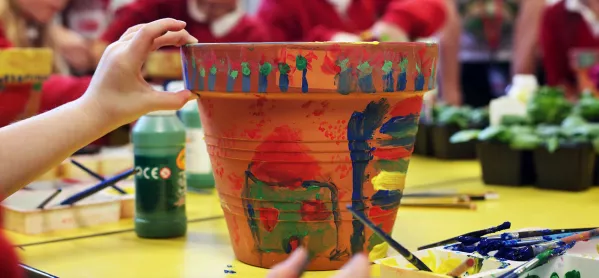
- Home
- How to revamp your primary curriculum
How to revamp your primary curriculum

Broad. Balanced. Mastery. Skills-based. Knowledge-based. Cross-curricular. Child-centred. Creative. Inclusive. Many of these words are used daily by teachers and leaders across the country to describe the curriculum in their school.
Of course, we all aspire to offer the “perfect” curriculum, which ticks all the boxes for children, parents and Ofsted. But how often do we ask ourselves the most important question of all: why?
Why do we teach our curriculum, to our children, in our school? Yes, we may have developed a wonderfully broad and balanced mastery curriculum that is child-centred, creative and inclusive - but is it relevant?
Why do we teach the topics we teach in particular year groups? Is it because it’s what we’ve always done? Is it because we have invested in the resources? Or is it because we actually enjoy teaching that topic?
Quick read: How to take a thematic approach to the curriculum
Quick listen: Why we need a curriculum based on what is ‘useful’
Want to know more? How to build a primary curriculum
My school is undergoing a pilot inspection under Ofsted’s new inspection framework later this year, which means that we have had to ask ourselves these questions and to accelerate our plans for curriculum improvement.
In preparation for our inspection, we first needed to refer to the three new additions to the “Ofsted English Dictionary”. These are known as the three “Is”:
- Intention
- Implementation
- Impact
Roughly, these translate to:
- Why do we teach what we teach?
- How do we teach it?
- What is the outcome? What progress did the children make?
Here’s how we began the process of critically reflecting on the curriculum we deliver every day, and making sure that we deliver the three Is.
Intention
When thinking about curriculum intention, we considered Simon Sinek’s theory of ”Golden Circles”. He explains this concept in a TED talk about how great leaders inspire action and stresses the importance of always starting with “why”.
“People don’t buy what you do. They buy why you do it,” Sinek says, going on to explain that the most successful organisations in the world are those that start with their reasons for doing something and place great importance on understanding and sharing these reasons.
In other words: intention must underpin everything.
We decided it was valuable for all subject leaders to have a good understanding of their “why” in terms of their subject content. We spent staff development meetings in subject teams writing a rationale for each of the foundation subjects. Our school intake is predominantly white British and we are situated in an area of high deprivation; we recognised that our foundation subjects need to reflect and respond to our demographic. We also need to provide knowledge, skills and experiences that may not be relevant to another school that is just a few miles away but has a very different demographic.

Implementation
We all love to design exciting and inspiring lessons for the children in our classes. I, for one, certainly sleep better at night knowing I have a cracking hands-on investigative science lesson planned and ready to go for the next day.
But, to return to our critical friend “why?”, we have to ask ourselves: are our topics really as exciting and inspiring as we thought they were when we last revamped the curriculum five to 10 years ago?
To answer this, we planned a two-day Dragon’s Den-style Inset. In the staff meetings leading up to it, subject teams were given the brief to plan two brand new topics (KS1/EYFS and KS2) with their subject as the central focus. The only other rule was that it needed to link to a high-quality text and to include visits, visitors or an experience.
Subject teams were asked to present their topics at the Inset in any way they chose. Needless to say, we didn’t need much encouragement to come up with engaging and exciting presentations (some of which involved fancy dress), but the topics themselves also proved to innovative, refreshing and exciting. The PE team planned a topic about the Women’s Rugby World Cup with brilliant geography and civil rights links; the music team planned an Andrew Lloyd Webber topic with links to drama and writing our own musical; and the history team introduced us to JM Barrie, the author of Peter Pan who (unbeknown to us) lived locally.
The second part of the Inset focused on implementation: how could we incorporate these new topics into our curriculum while still ensuring coverage?
Year teams went back to their curriculum maps to discuss which topics they would like to “bid” for - considering the national curriculum statutory programmes of study. Year leaders then met to bid for the topics they wanted and worked together to make sure we met the statutory expectations.
Impact
Starting the school year with two new topics in each year group has given our curriculum a well-needed revamp - for both staff and children. Naturally, there are challenges involved in this process, such as resourcing new topics, starting plans from scratch and visiting new places, but, as with all new things, there is a buzz of excitement around the school and one that I hope will continue as the year goes on and we see the impact of our changes.
Rebecca Misselbrook is deputy headteacher at White Meadows Primary Academy in Littlehampton, West Sussex
Further reading
- DfE consultation: Education inspection framework 2019: inspecting the substance of education
- Why an ‘interleaving’ curriculum could improve knowledge retention
- Collaborative planning: 7 steps to doing it well
Register with Tes and you can read five free articles every month, plus you'll have access to our range of award-winning newsletters.
Keep reading for just £4.90 per month
You've reached your limit of free articles this month. Subscribe for £4.90 per month for three months and get:
- Unlimited access to all Tes magazine content
- Exclusive subscriber-only stories
- Award-winning email newsletters
You've reached your limit of free articles this month. Subscribe for £4.90 per month for three months and get:
- Unlimited access to all Tes magazine content
- Exclusive subscriber-only stories
- Award-winning email newsletters


